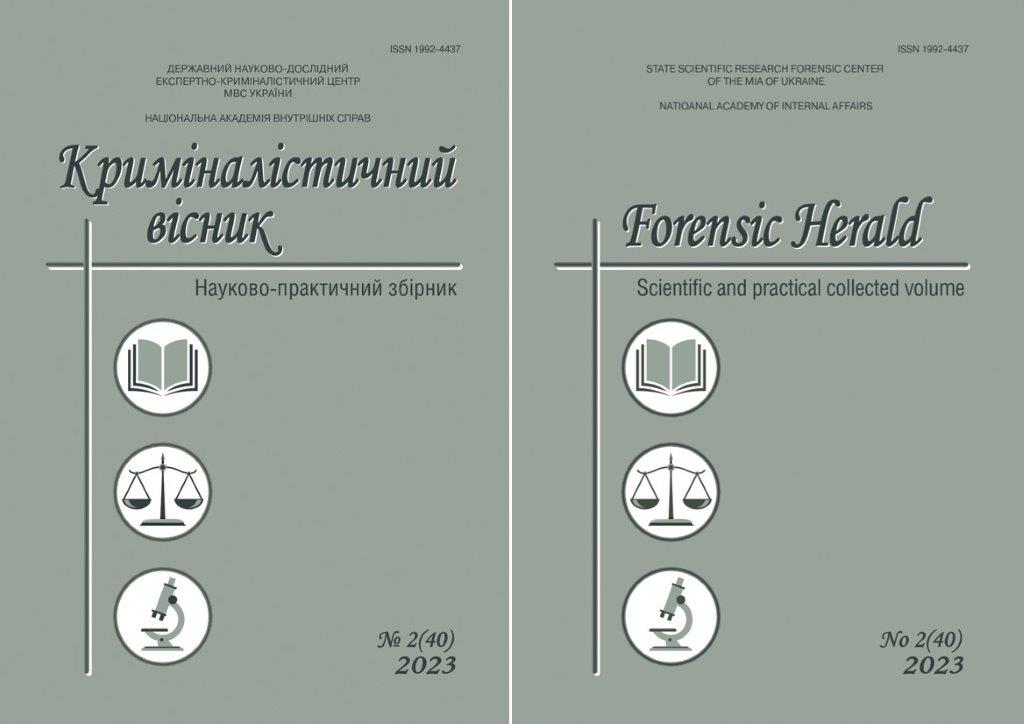PECULIARITIES OF SEMANTIC-TEXTUAL EXAMINATION IN THE INVESTIGATION OF ACCEPTANCE OF AN OFFER, PROMISE OR RECEIPT OF AN UNLAWFUL BENEFIT BY AN OFFICIAL
DOI:
https://doi.org/10.37025/1992-4437/2023-40-2-43Keywords:
special knowledge, semantic and textual expertise, sequence of expertise, expert opinion, unlawful benefit, officialAbstract
Abstract. In the course of investigation of criminal offences involving acceptance of an offer, promise or receipt
of an undue benefit by an official at the pre-trial investigation stage, it is advisable to conduct a semantic and textual
examination. At the same time, the practice of investigation of this type of criminal offences shows that a complete and
objective investigation requires special knowledge, and this makes it relevant to highlight the possibilities of semantic
and textual expertise as one of the forms of use of special knowledge in the course of investigation of criminal offences
involving acceptance of an offer, promise or receipt of an undue benefit by an official, and thus determines the purpose
of this article. Methodology. The methodological basis is formed by both general scientific and special methods of
scientific knowledge, in particular: generalisation, analysis and synthesis – to develop reliable conclusions as a result
of processing a set of scientific and empirical sources on the chosen topic. Scientific novelty. The article develops a
sequence for solving the tasks of semantic and textual examination in the course of investigation of criminal offences
involving acceptance of an offer, promise or receipt of an undue benefit by an official. Results. The author substantiates
the expediency of appointing and conducting a semantic and textual examination (establishing the presence in the
materials provided for examination of calls, incitement, provocation of a person to accept an offer, promise or receipt
of an undue benefit, a request to provide an undue benefit, and also establishing the signs of subtextual (or ambiguous)
interpretation of words and statements) at the pre-trial investigation stage during the investigation of corruption
offences, in particular, acceptance of an offer, promise or receipt of an undue benefit by an official. As the practice of
investigating this type of criminal offence shows, a full and objective investigation requires specialised knowledge. At
the same time, for a complete and impartial investigation of criminal offences under Article 368 of the Criminal Code
of Ukraine, the conclusions of semantic and textual examination cannot be the only source of evidence in criminal
proceedings, as they are sometimes probable. However, it should be borne in mind that the reasons for the probable
conclusion are not the incompetence or dishonesty of linguistic experts. The reasons are objective and may be due
to the inferiority of the objects of research, lack of research methodology, poor preparation of research materials and
other circumstances that make it impossible to provide a categorical expert opinion. We see further scientific research
as revealing the peculiarities of conducting a comprehensive psychological and linguistic examination. Since this
type of examination covers expert situations related to the establishment of meaningful characteristics of the text and
psychological characteristics of the speech behavior of the participants communicative interaction to determine the
directionality of the communicated information, which is an important aspect in the investigation of criminal offences
involving acceptance of an offer, promise or receipt of an undue benefit by an official



